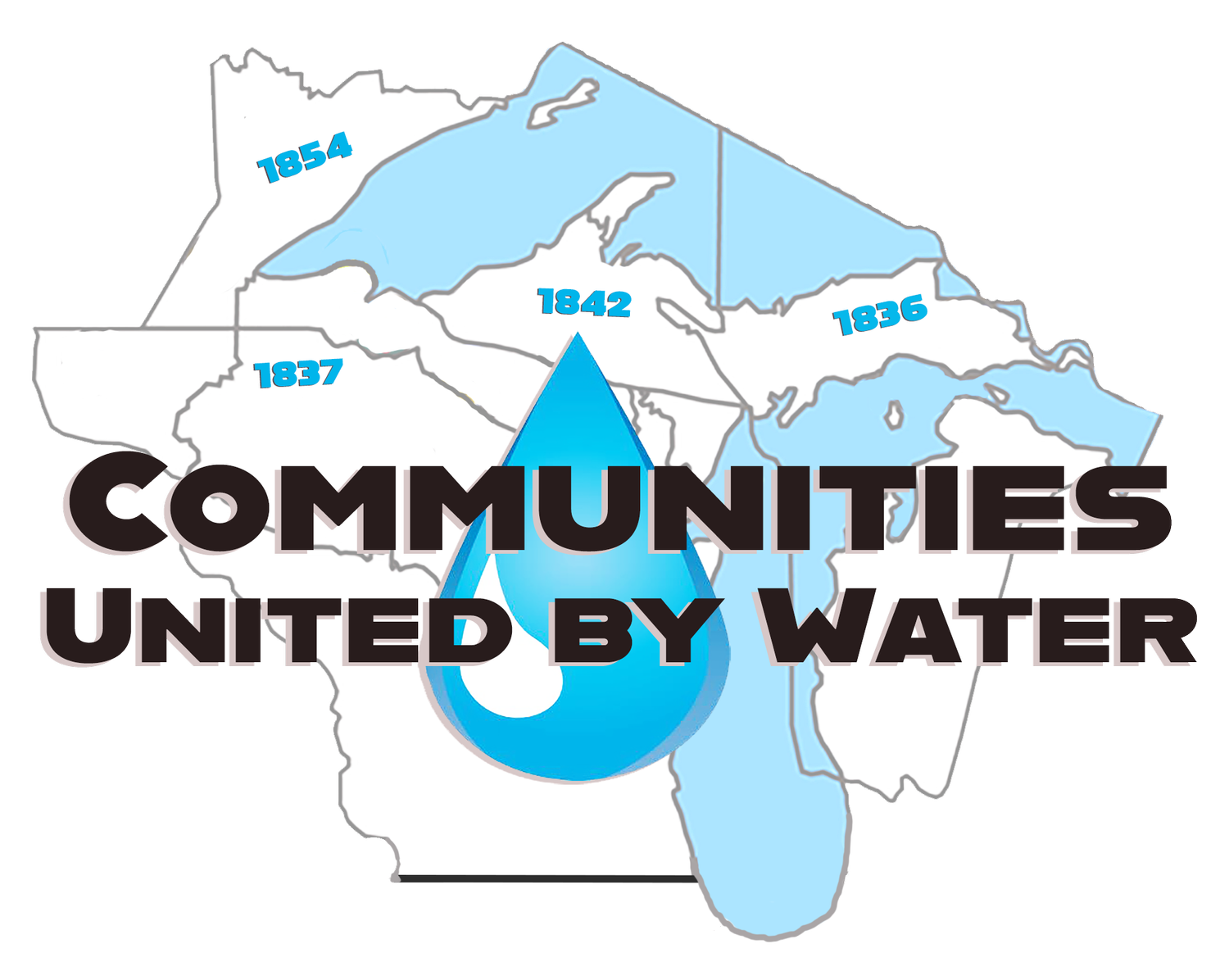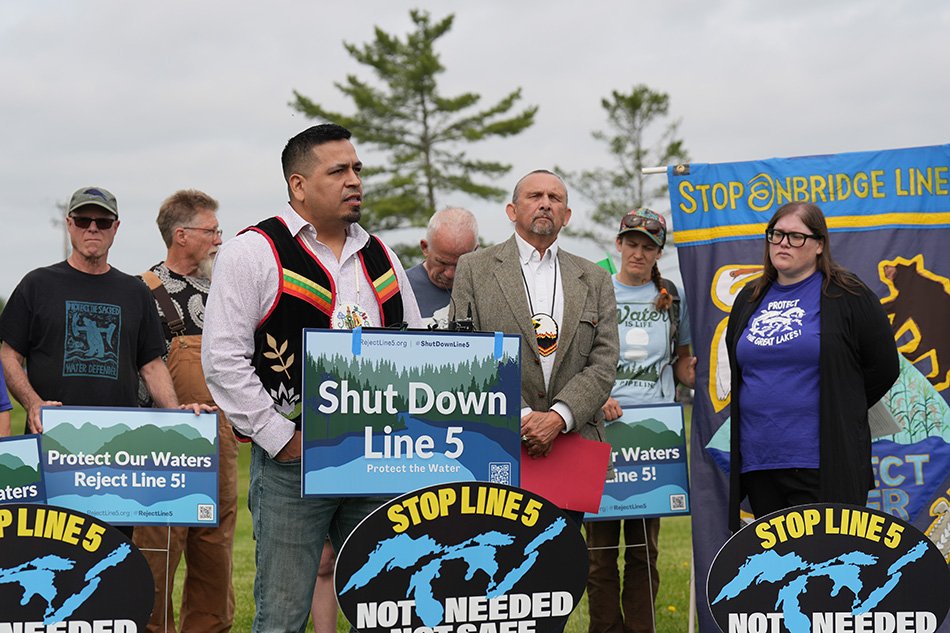Over 150k Public Comments Oppose Federal Permits for Line 5 Pipeline
Bad River Tribal Council Members and activists at a press conference prior to the Army Corps hearing. Photo credit: Devon Young Cupery
Enbridge seeks federal and state approval to extend its trespassing pipeline
Press contact: Timna Axel, EarthJustice, taxel@earthjustice.org
St. Paul, MN — The Bad River Band of Lake Superior Chippewa in northern Wisconsin and a coalition of environmental, faith, and health groups have submitted over 150,000 comments to the U.S. Army Corps of Engineers (USACE), urging the federal agency to take a harder look at and ultimately reject a proposal by Canadian company Enbridge to reroute its outdated and dangerous Line 5 oil pipeline.
At a press conference Wednesday, Chairman Robert Blanchard of the Bad River Band said: “This is what we’re fighting for: Our homelands, our way of life.”
In addition to the more than 150,000 comments submitted by individuals, comment letters opposing the reroute were also submitted by:
The Bad River Band, represented by Earthjustice
Great Lakes Business Network of more than 200 businesses and business leaders
Healthy Climate Wisconsin and more than 20 health organizations, including the Wisconsin Public Health Association and American College of Physicians.
After willfully trespassing on the Bad River Band reservation for over a decade, Enbridge now proposes to build 41 miles of new pipeline around and upstream of the reservation’s boundaries. The reroute would involve blasting, horizontal drilling, or trenching across hundreds of wetlands and streams, threatening the same watershed and treaty rights as the current pipeline. The reroute also poses the risk of a catastrophic oil spill contaminating Lake Superior, the largest and healthiest of the Great Lakes that provide drinking water for around 40 million people.
Project opponents have outnumbered supporters at in-person and virtual hearings, including by a two-to-one margin during a USACE hearing this June and by a three-to-one margin during a state agency hearing earlier this month. The Environmental Protection Agency has said the reroute will have “substantial and unacceptable” impacts on the Bad River and the Kakagon-Bad River Sloughs, a wetland of international importance under the Ramsar treaty that houses the largest wild rice bed in the Great Lakes. Wetlands are particularly important for protecting lives and infrastructure from severe flooding in the region, which has experienced multiple 500- and 1000-year floods in the past 10 years, creating highly risky conditions for an oil pipeline.
To begin construction, Enbridge still needs permits from USACE, the U.S. Department of Transportation, Wisconsin Department of Natural Resources, and local agencies.
More statements:
Quannah ChasingHorse, executive producer of BAD RIVER and water protector: “We call upon and expect the Army Corps of Engineers to respect the voice of the Bad River Band. The Band has been forced to battle a Canadian pipeline operator who promised in writing to remove this piece of pipeline back in 2013, but failed to honor that promise. We ask that the Army Corps of Engineers make the right decision here. This decision will affect all of us and we need the pristine water source of Lake Superior for future generations. Protecting our water, sovereignty, and land protects our people and inevitably, the world.”
Isak Drangsvit, Student Activist with Action for the Climate Emergency (ACE): “Line 5 is an investment in a future that doesn’t exist anymore. There’s no return on the money and natural destruction spent on a project that leads to the past. Young people of Wisconsin will accept nothing but a resounding denial from our regulators to shut down Line 5.”
Rene Ann Goodrich, Bad River Ojibwe, Native Lives Matter Coalition, Indigenous Women’s Treaty Alliance (facilitated by WECAN): “As a Bad River tribal member our way of life, historical homelands, cultural resources, subsistence, wildrice, medicines, fisheries, and water are in direct jeopardy of an imminent catastrophic oil spill. We call for the Army Corp to shutdown Line 5 permanently and to deny all permits for the proposed Wisconsin reroute project. We reject the reroute and we stand with the water — we will always stand with the water.”
Juliette King McAvoy, Vice President of Sales and Marketing for King Orchards and Co-Chair of the Great Lakes Business Network: “A spill from Line 5 would be catastrophic for our regional economy, affecting everything from tourism to the fishing industry. The Great Lakes are an invaluable asset, and safeguarding them is critical to protecting the jobs and businesses that depend on clean water.”
Liz Kirkwood, executive director of For Love of Water (FLOW): “The will of the people in Wisconsin and throughout the Great Lakes is clear: our interconnected watershed is not the place for a massive new oil pipeline. And now, as we confront climate change, is not the time to enable burning more atmosphere-clogging fossil fuels. While we stand on the precipice of a cleaner, prosperous, renewable energy future, Enbridge’s proposal is a dirty pipeline to the past.”
Brett Korte, Clean Wisconsin Staff Attorney: “The reroute is not a just resolution to Enbridge’s trespass nor an adequate solution to the risks posed by the current line. It would still be in the Bad River watershed, continuing to put the Bad River Band’s land at risk and endangering even more miles of waterways than the current line.”
Peter Laing, Owner of MAWBY Vineyards and Co-Chair of the Great Lakes Business Network: “Our economy thrives because of the Great Lakes, and any threat to this resource is a threat to our businesses. Rejecting the Line 5 reroute is not just an environmental decision; it’s an economic imperative for the region.”
Gussie Lord, Managing Attorney for Earthjustice: “This reroute is not a solution; it extends the dangers of the pipeline and increases the threat of a devastating oil spill.”
Abby Novinska-Lois, Executive Director of Healthy Climate Wisconsin: “Health professionals are speaking up because these spills threaten safe drinking water for millions. This project would lock us into a future with more fossil fuels, which drive climate change that sickens our patients and communities.”
Osprey Orielle Lake, Executive Director, Women’s Earth and Climate Action Network (WECAN): “Rejecting the permit for the Line 5 Wisconsin reroute is an opportunity to champion climate justice, and to act in solidarity with Tribes calling for the permanent shutdown of Line 5, and the 150K people who oppose the new permits. Together, we can create a powerful force to safeguard the Great Lakes, the climate, and future generations.”
Britnie Remer, 350 Wisconsin Fossil Fuel Resistance Organizer: “Decommissioning Line 5 and transitioning to renewables would eliminate immeasurable risks, create sustaining jobs, and shift our dependence on dirty fossil fuels to cleaner and more reliable energy. It’s far past time to shut down this dangerous pipeline.”
Ashley Rudzinski, Climate and Environment Program Director for Groundwork Center for Resilient Communities: “Our communities and local economies are deeply connected to the health of the shared waters of the Great Lakes, and Enbridge’s Line 5 reroute threatens that vital connection. Investing today in resilient, climate smart, clean energy solutions is not only safer but it also strengthens our regional economy and protects the livelihoods of all who call the Great Lakes home.”
Beth Wallace, Director of Climate and Energy for the National Wildlife Federation: “Line 5 must be decommissioned, not expanded. Protecting Tribal lands and waters is non-negotiable. Over 150,000 people have told the Army Corps of Engineers to reject Line 5 near the Bad River. This pipeline should never have been built here, and now is not the time for more disrespectful doubling down.”
Elizabeth Ward, Sierra Club Wisconsin Chapter Director: “Line 5 is an existential threat to the Bad River Band, all those who rely on the Great Lakes, and our climate. People across the country are paying attention, calling out the reroute proposal as a false solution, and demanding that Line 5 be shut down once and for all.”
Jason Wilhite, Activism Team Lead for Patagonia and Great Lakes Business Network Executive Committee: “A rupture of the Line 5 pipeline would have a devastating impact on our regional economy, our drinking water, and our community’s ability to recreate.”

